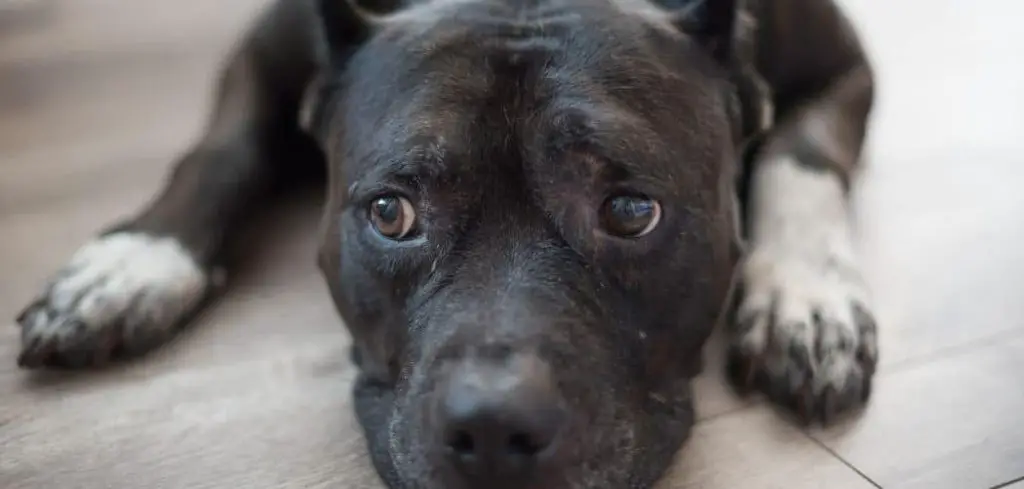When an old dog is not eating or drinking, it is a serious warning sign that something is affecting their health.
Loss of appetite and refusal to drink can quickly lead to dehydration, malnutrition, and systemic complications if not addressed promptly.
We outline the common reasons why an old dog may not be eating or drinking, what you can do at home, and when to seek veterinary help.
Old Dog Not Eating or Drinking — Why It Happens
An old dog not eating or drinking is usually a sign of serious illness or decline. Common causes include organ failure (such as kidney or liver disease), severe infections, gastrointestinal problems, pain, or even end-of-life changes. Loss of appetite and refusal to drink often mean your dog’s body is no longer functioning properly or they are too weak to maintain normal habits.
Older dogs have reduced physiological reserves, so even brief periods without food or water can lead to rapid decline, making early evaluation critical.

Old Dog Not Eating or Drinking: Common Causes
Kidney Disease
Kidney dysfunction often reduces appetite and can decrease water intake if nausea or oral discomfort develops.
Other signs may include increased urination initially, vomiting, weight loss, and lethargy. Without prompt veterinary care, kidney disease can quickly become life-threatening due to dehydration and toxin buildup.
Read more: Old Dog Not Eating but Drinking Water (Hydration without appetite)
Liver Disease
Liver problems can lead to nausea, loss of appetite, and decreased thirst.
Dogs may appear lethargic, have yellowed gums or eyes, and show signs of discomfort. Drinking may be reduced if the dog feels nauseated, increasing risk of dehydration.
Veterinary intervention is essential for diagnosis, supportive care, and slowing disease progression.
Pain or Arthritis
Chronic pain from arthritis or other conditions may make it uncomfortable for older dogs to move, eat, or drink.
Pain can reduce appetite, and difficulty reaching the water bowl may limit drinking. Signs include limping, reluctance to stand, vocalizing when moving, or restlessness.
Managing pain with vet-approved treatments and making food and water easily accessible can improve intake and comfort.
Infections
Systemic infections, including urinary tract infections, pneumonia, or sepsis, may reduce appetite and drinking behavior.
Signs include lethargy, fever, weakness, vomiting, or diarrhea. Older dogs are less able to compensate, so these infections can escalate rapidly without intervention.
Prompt veterinary assessment ensures early treatment with fluids, antibiotics, or supportive care.
Gastrointestinal or Pancreatic Issues
Conditions like gastritis, pancreatitis, or intestinal blockages can reduce both appetite and willingness to drink.
Dogs may show nausea, vomiting, abdominal pain, or bloating. Chronic gastrointestinal discomfort discourages eating and drinking, increasing the risk of dehydration.
Veterinary care is essential for diagnosis and treatment, which may include hospitalization, medications, or dietary modifications.
Cancer
Cancer affecting the digestive system, liver, or other organs may reduce appetite and thirst.
Dogs may also display weight loss, fatigue, or other systemic symptoms. Appetite loss in senior dogs should always raise concern for serious conditions such as tumors or organ dysfunction.
Early veterinary evaluation can provide treatment options and improve comfort.
What to Do If Your Old Dog Is Not Eating or Drinking
Provide a calm, quiet environment to reduce stress, which may encourage food and water intake.
Offer small, soft, or bland meals and ensure water is easily accessible. If the dog is unable to drink voluntarily, ice cubes, low-sodium broths, or syringe feeding under veterinary guidance may help.
Monitor closely for signs of dehydration, such as dry gums, sunken eyes, or lethargy. Documenting appetite, water intake, and behavior changes helps your veterinarian diagnose the underlying cause.
Avoid forcing food or water, as this can cause stress or aspiration.
When to Call or Visit Your Vet
Immediate veterinary care is essential if your dog refuses all food and water.
Seek urgent attention if you notice:
Persistent vomiting or diarrhea
Severe lethargy, collapse, or weakness
Signs of pain, bloating, or abdominal swelling
Blood in vomit, stool, or urine
Older dogs can deteriorate quickly without hydration and nutrition, so timely evaluation is critical to prevent serious complications and ensure appropriate treatment.
Read more: Old Dog Not Eating (Causes and what to do)
Key Takeaway
When an old dog is not eating or drinking, it indicates potential medical emergencies, including organ disease, infections, pain, gastrointestinal issues, or cancer.
Supportive care at home includes offering soft meals, accessible water, and a calm environment, but veterinary evaluation is critical.
Early intervention can prevent dehydration, malnutrition, and other complications, maintaining comfort and health for senior dogs.
